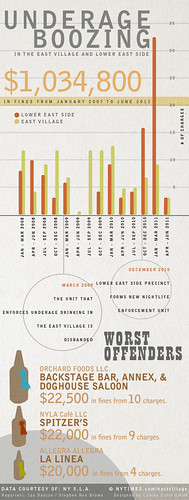 Natalie Rinn
Natalie RinnCould new zoning help bring mom-and-pop businesses to the East Village and Lower East Side, and keep them there? Community Board 3’s Economic Development Subcommittee met last night to continue a discussion about retail diversity.
Mary DeStefano, the Urban Planning Fellow from Hunter College who has been working with the board, again raised the possibility of Special Purpose Districts, 20 of which have been created in Manhattan by the City Planning Commission in order to meet the specific needs of their neighborhoods. In Community Board 3, such a district would likely put a cap on chain stores and curb operating hours. Ms. DeStefano clarified that S.P.D.’s are “not banning anything, just seeking a way to preserve it, and it’s just giving the community some level of control.” Read more…
 Natalie Rinn Susan Stetzer points at documents as S.L.A.
Natalie Rinn Susan Stetzer points at documents as S.L.A.
committee chair Alexandra Militano leafs through them.Before finalizing a controversial set of stipulations that would ease Community Board 3’s stance against new beer-and-wine licenses in nightlife-heavy areas – so long as applicants agree to close shop early – a task force decided last night to seek counsel from a higher power: the State Liquor Authority.
During a meeting at C.B. 3’s offices last night, District Manager Susan Stetzer said that the board should repair a feeling that it is particularly unbending, shared by applicants and the S.L.A. alike. “We have become infamous,” she said, explaining that applicants’ lawyers approach the S.L.A. and say, “C.B. 3 has a moratorium [on new licenses in resolutions areas], and it’s illegal” – a sentiment with which S.L.A. chair Dennis Rosen agrees, according to Ms. Stetzer. “We are losing respect and clout,” she said. Read more…
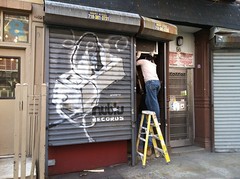 Stephen Rex Brown Future home of Bikinis.
Stephen Rex Brown Future home of Bikinis.Two items proved contentious at a meeting of Community Board 3’s liquor licensing committee last night: Neighbors got their bottoms in a bunch over Bikinis, a sandwich shop that had been vying for a controversial backyard space. And the new project in the former Superdive space got the committee’s thumbs-down once again.
First, the good news: At 116 Avenue C, the owners of popular newcomer Edi and the Wolf are opening a new Austrian tavern. Transfer of the existing full liquor license quickly and easily got the committee’s support. Also: Angelica Kitchen, which had been illegally allowing customers to bring their own bottles, got a vote of support for its first wine and beer license, which the owners said would help it resume BYOB service.
Meanwhile a “simple ground-floor sandwich shop,” as a representative described it, due to open at 56 Avenue C didn’t have such an easy time of it. The owners of Bikinis, which will serve the like-named Spanish sandwiches, made clear that the backyard they had previously expressed interest in using was off the table for the moment. But eleven community members lined up to protest anyway, some insisting the noise from the supermarket recycling machines on the corner and the oft-overpowering music and revelry from Nublu was already unbearable. Read more…
On Friday, Second Avenue lounge Lit celebrated its ten years as a gathering place and showcase for downtown’s musicians, artists, D.J.s, and plain ol’ cool kids. The Local managed to squeeze a video camera into the crowded house and spoke to owners Erik Foss and David Schwartz, along with Nick Zinner of the Yeah Yeah Yeahs (one of the night’s many star D.J.s) and Alli Pheteplace and Ryan Macdonald of the Bootblacks, who performed downstairs. Stay tuned this week as we look back on ten years of bands (everyone from Panthers to Japanther), art shows, and bathroom hijinks, and feel free to share your own Lit stories (if you can remember them?) in the comments.
Photos: Noah Fecks. Cocktails, in order: Friend of the Devil (two photos), Gin and Juice (three photos), Manhattan, Lady of the Night (three photos), and J. Crusteau at Booker and Dax; I Hear Banjos (two photos) at The Wayland; Beetnick, Manhattan on Draught, Bowery Fix, and Yankee Mule at Saxon + Parole; Flor de Jalisco, 1890, Bitter Mule, and Pimm’s Tonic at The Wren; and G.P. Spritz and The Last Cocktail at Prima.
Jason Mendenhall, a partner in the new cocktail bar on Avenue C, The Wayland, knows the East Village has long been a drinks destination. “I’ve heard people refer to the neighborhood as the cocktail ghetto,” he recently told The Local. Lately, mixologists like Mr. Mendenhall have been raising the proverbial bar on tired old speakeasy drinks, with twists that have nothing to do with lemon rinds: we’re talking red-hot pokers, smoke capsules, and centrifuges.
Take Mr. Mendenhall’s most popular creation, I Hear Banjos. The mixologist roasts apples to make bitters for the corn-whiskey and applejack drink (he’s also working on umami bitters, made from various mushrooms). But that isn’t the impressive part. For campfire effect, the drink is capped with an upside-down snifter full of applewood smoke. Mr. Mendenhall is planning an entire line of smoked drinks (and a line of drinks incorporating vegetables like kale and beets, as well), and he also hopes to create smoked ice.
At Booker and Dax, the recently opened bar at Momofuku Ssam, partner Dave Arnold is going one step further than using a smoking gun – he’s wielding a red-hot poker. “It has an internal temperature of 1,500 degrees Farenheit,” he said. “We shove it into the drink to create burnt-caramel flavors that you can’t get by making a hot drink on the stove.” Read more…
Photos: Vivienne Gucwa
Getting a table or a bar stool at the Holiday Cocktail Lounge Saturday night was nearly impossible. The 47-year-old dive was wall-to-wall with regulars, there to pay respects on its final night.
“I came here before I was legal,” said Angela Martenez, who frequented the Holiday in the 1990s. “The drinks were strong and cheap. And the little twinkly Christmas lights were friendly, and that’s what I needed in my life at the time.”
From all corners of the city, former East Villagers returned to the Holiday for one last beer. Read more…
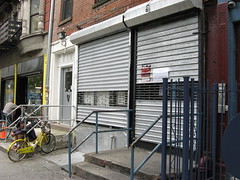 Stephen Rex Brown
Stephen Rex BrownAfter abruptly shuttering during the summer and moving its parties to the basement of Lucky Cheng’s, Nublu will reopen at its original Avenue C location, serving beer and wine rather than hard liquor.
E-mailing from Sweden, Nublu’s owner, Ilhan Ersahin, said that the club would reopen tonight at 62 Avenue C and will once again operate from 8 p.m. till 4 a.m. nightly, but will now host earlier shows at lower volumes. He described the new operation as “less clubby style,” with “more wine/lounge/art/talky kinda vibes,” and said that finger food would be served. He added that there would be “more acoustic-friendly nights, neighborhood-style, with an international touch” in keeping with his record label. Read more…
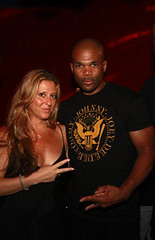 Cyn Darling Ariel Palitz with Darryl McDaniels from Run DMC.
Cyn Darling Ariel Palitz with Darryl McDaniels from Run DMC.The owner of the neighborhood’s hip-hop haven is looking to expand her brand and open a new business that goes beyond the club scene.
Ariel Palitz, the owner of Sutra Lounge on First Avenue, put her club on the market last week — only a few days before she celebrates its seventh anniversary.
While insisting that her business was making as much money as ever, Ms. Palitz admitted to The Local that she has been mulling over a new endeavor in the East Village.
“It’s a unique idea. It will have food, alcohol, there will be unexpected services — it’s going to be an unexpected twist on what I think the future of nightlife is,” she said, without going into further details. Read more…
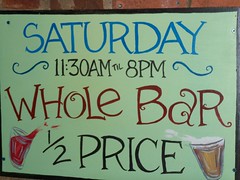 Simon McCormack
Simon McCormackDuring two separate meetings with representatives of the police department this week, East Villagers complained about noise caused by the 13th Step on Second Avenue between Ninth and Tenth Streets, with one resident comparing the sports bar to Sodom and Gomorrah. Last night, other bars – including the Village Pourhouse, Webster Hall, and Amsterdam Billiards – were also singled out as sources of fighting and noise.
At Tuesday’s meeting of the Ninth Precinct Community Council, David Keller, who lives across the street from the bar, complained that “late at night, it transforms into a nightclub. There is a line winding down the street.” Lieutenant Patrick Ferguson described it as one of the most successful bars in the neighborhood. He said the police were well aware of the quality of life issues there, but that it passed a noise test by the Department of Environmental Protection on Sept. 17, so there wasn’t much he could do.
Last night, the bar came up again at a community forum at Webster Hall, meant to address ongoing nightlife problems around Second and Third Avenues.
A crowd of about 25 gathered at the nightclub to discuss heavy foot traffic, street noise, and drunken behavior in the northwest corner of the East Village on weekend nights. Webster Hall general manager Gerard McNamee, who began hosting bi-annual community forums about four years ago, moderated the conversation, which incorporated voices of neighbors across generations and representatives from popular bars on nearby blocks, including the Village Pourhouse and Amsterdam Billiards. Read more…
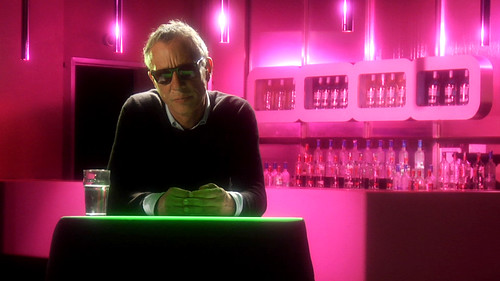 Courtesy of Magnolia Pictures Peter Gatien today.
Courtesy of Magnolia Pictures Peter Gatien today.Many students moving into NYU’s Palladium dorm this week likely had no clue that their new East 14th Street address was, until 1998, home to a notorious nightclub of the same name. Now a documentary by Billy Corben, director of “Cocaine Cowboys” (a cult-hit chronicle of the Miami drug scene in the 1980s) revisits the era when the club was a fixture of New York City nightlife, and when its owner, Peter “King of Nightlife” Gatien, was at the heart of two dramatic court cases that represented a larger fight between the hedonism of the late eighties and the Giuliani-induced law and order of the mid-nineties. Read more…
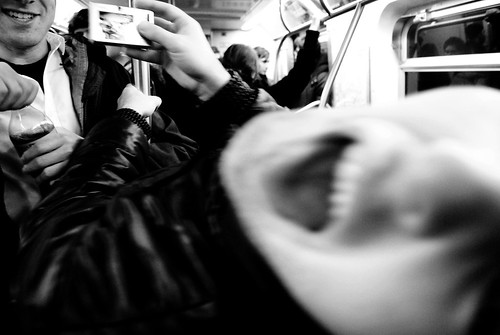 Rachel Citron The 7th Precinct has been targeting bar owners for serving drinks to minors.
Rachel Citron The 7th Precinct has been targeting bar owners for serving drinks to minors.The police crackdown on bars in the Lower East Side resulted in a dramatic increase in charges of underage drinking against business owners, data provided by the State Liquor Authority shows.
During a three-month stretch of intense enforcement early this year, the S.L.A., which acts on recommendations from the police, handed down 39 charges of underage drinking in the neighborhood, compared to 31 charges issued during all of 2009 and 2010.
Bar owners in the three zip codes that, taken together, include the East Village and Lower East Side faced 230 charges of serving minors from 2007 to 2011, resulting in $1,034,800 in fines. The data shows that large numbers of charges come during intense periods of enforcement, and bars in the Lower East Side in particular have faced an unprecedented and disproportionate amount of scrutiny this year.
Each offense results in fines of up to $10,000, and repeat offenders risk being shut down permanently. Some of the more high-profile watering holes caught in the dragnet include Mason Dixon (which eventually closed altogether) and Welcome to the Johnson’s.
The increase in enforcement came as the 7th Precinct resurrected its cabaret unit, which focuses on the Lower East Side’s booming nightlife scene, as well as the arrival of Capt. David Miller at the precinct last year. An officer with Community Affairs in the 7th Precinct would not comment on enforcement of sale of alcohol to minors.
In 2009, the East Village’s 9th Precinct disbanded its own cabaret unit, though at a recent community meeting Deputy Inspector Kenneth Lehr said underage drinking remained a priority.
Many bar owners say that they are being unfairly punished for an issue beyond their control.
Read more…
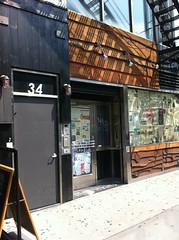 Todd Olmstead The doorway of 34 Avenue A.
Todd Olmstead The doorway of 34 Avenue A.I felt very young last week, sitting at the Community Board 3 meeting at 200 East Fifth Street. Being 21 years old, there were surely other attendees my age, or younger. But I could not beat the feeling that our voices and spirits were being silenced. I say this mostly because, as the Community Board again refused to support the application for a new experimental music venue at 34 Avenue A (formerly Mo Pitkins), a project of the music promoter Todd Patrick and Two Boots owner Phil Hartman, I felt like one of the few attendees who genuinely understood the cultural significance of what their proposed space, The Piney Woods, could be.
Imagine my surprise yesterday afternoon, when, flicking through Gmail on my iPhone, I found a response from Richard Hell, musician, punk innovator, East Village resident,and one of the most influential musical figures to come out of the neighborhood, in support of the application. The board is scheduled to consider it again at its meeting tonight.
“The Lower East Side needs a specialized, non-pop music room for musicians who are in it for other things than head-banging or making it big,” Mr. Hell told me. “Headbanging and raw ambition are fine, but there are plenty of venues for that already, and the Lower East Side would do well to maintain or recover its tradition of cutting edge art.”
Read more…
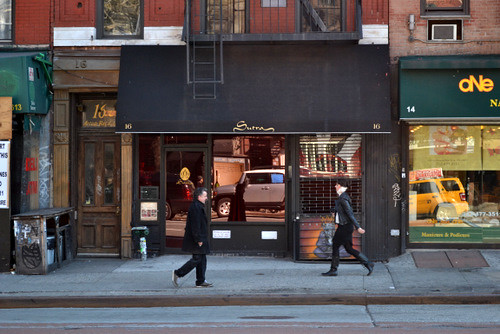 Ian Duncan Sutra lounge, owned by Community Board 3 member Ariel Palitz.
Ian Duncan Sutra lounge, owned by Community Board 3 member Ariel Palitz.Community Board 3 should be taking a rest from conflict. Last week, in a vote meant to end five months of debate, it finally passed a set of reforms to the way it makes recommendations about licenses to the State Liquor Authority. But bar owners who sit on the board are not satisfied and have vowed to challenge the new rules and investigate why they were banned from voting on the reform package.
Shortly before last Tuesday’s meeting, a complaint was made against David McWater, a board member who owns three bars on the Lower East Side. Susan Stetzer, Community Board 3’s district manager, referred it to the city’s Conflicts of Interest Board. In a written response, COIB officials recommended that the three bar owners on the board be barred from voting on the reform resolution, as they had a direct financial stake in the vote.
At the meeting, Ariel Palitz, a board member who owns Sutra Lounge on First Avenue at First Street, called the recommendation an “eleventh-hour attempt to gag” bar owners. Mr. McWater, who was recovering from a fall, was absent from last week’s meeting.
Read more…











